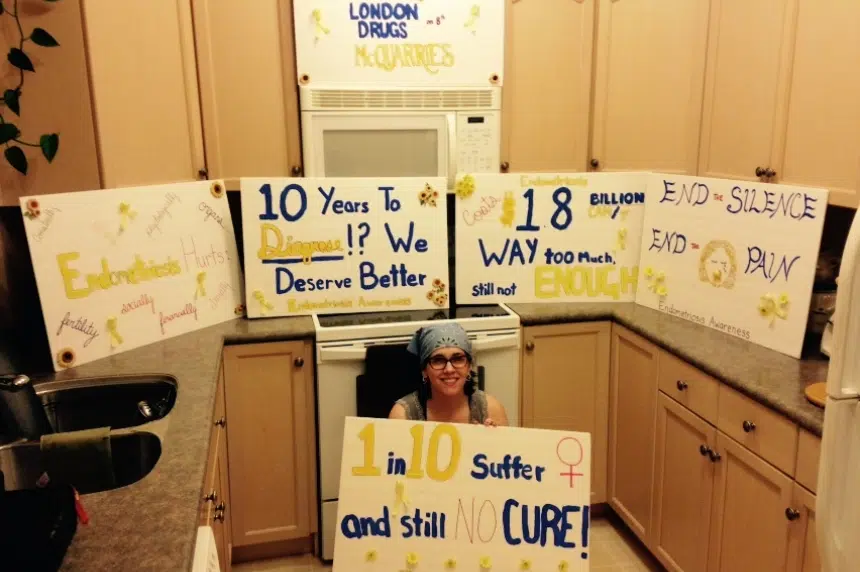When she was 13 years old, Laura Cone was put on birth control to help ease the intense pain she experienced during menstruation. It took eight years for her to find out why it wouldn’t go away.
Cone, 30, was finally diagnosed with endometriosis when she was 21 years old. But the nightmare didn’t end there, she said. In the following years she struggled to get the help she needed to treat a pelvic-pain condition that had festered in her body for so long.
“It’s more common than heart disease and diabetes, yet most people don’t know about it,” Cone said.
The Saskatoon woman is co-organizing the province’s first endometriosis conference on Saturday, Sept. 19 at Royal University Hospital. Guests include a psychologist, yoga therapist and disability lawyer as well as a specialist from a pelvic-pain centre in B.C. as the keynote speaker.
The event is open to the public but aimed at people who have — or think they might have — endometriosis. Statistics show that around one in 10 women have the condition, which occurs when the lining of the uterus escapes the uterus and latches on to tissue and organs in the pelvic area and beyond. Patients often get severe menstrual pain and pelvic inflammation; sometimes the bloating is so extreme it can resemble a pregnancy, Cone said. However, many women suffering with endometriosis struggle to become pregnant.
But it can go overlooked because of the vagueness of its symptoms, taking an average of 10 years to diagnose. As a result, endometriosis often gets misdiagnosed as other pelvic-related conditions, such as irritable bowl syndrome (IBS) or pelvic inflammatory disease.
That misdiagnosis — combined with a lack of information about the disease — can keep sufferers in a helpless and debilitating state, Cone said. She describes visiting doctor after doctor, explaining that something wasn’t right, and being made to feel like she was going crazy.
“It gets to your head when somebody who society reveres says ‘there is nothing wrong with you, it’s all in your head’.”
Cone said the condition is “extremely complex” because it can act so differently in every patient. She describes stories of how people live their entire lives not knowing their body was riddled with endometriosis, while others are bedridden due to one, small piece.
But the cause of endometriosis remains a mystery, and there is no cure. Cone said one of the reasons why it is so hard to diagnose is because a diagnosis requires surgery, which many doctors are reluctant to do. While some doctors will conduct a test screening, Cone said the tests alone won’t always catch the disease.
“It can be microscopic. Just because it’s not found doesn’t mean that there isn’t a piece hiding behind your liver causing you grief,” she said.
Cone hopes the conference will provide doctors with more information about the disease as well. She said there are three endometriosis specialists in Saskatchewan: two in Regina and one in Saskatoon. But in order to reduce wait lists, she believes the province needs to train more specialists. Cone required a surgery that involved removing pieces of infected tissue from her body, but went to the United States for the procedure because she said the wait was too long in Saskatchewan.
Cone would also like to see more funding for a pelvic pain clinic in the province. She believes it’s important to have a specific space with dedicated doctors who understand the complexities of the disease. Cone points out many well-meaning doctors mistreat endometriosis patients because of a lack of knowledge.
“We need this conference to show (patients) that it’s okay to ask for help. It’s not okay to sit in pain and discomfort,” she said. “It’s not normal, and some doctors do tell you that, and that’s terrifying.”
Dr. John Thiel, one of Saskatchewan’s three endometriosis specialists, said the conference also aims to help women find alternative ways to treating chronic pelvic-pain other than surgeries and medication.
“Because often times medical students, they’re only as knowledgeable as their teachers, and traditionally in medicine, we’ve done a poor job of teaching not only how to manage acute pain, but how to manage chronic pain.”
Cone describes bouts of pain where she couldn’t leave her bed for months at a time. She can no longer work and had to sell her home. The disease has also affected her relationships with friends, her sex life, and her mental health.
But surgery has made life better, Cone said. As an advocate, she said her goal is to help women get diagnosed earlier and avoid the pain and stress she’s had to endure.
“It involves so much more than just this little space within our abdomen. It can absolutely ruin a person’s life.”
The Patient Conference on Chronic Pain and Endometriosis will be held at the Royal University Hospital’s East Lecture Centre from 8:45 a.m. until 4 p.m. To register email Laura Cone at saskendowarriors@hotmail.com.











